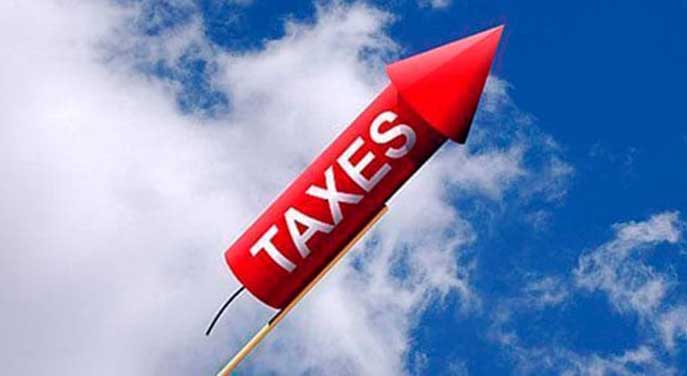Kenneth Brown
of The Clarion
An investment adviser from Saskatoon shared his expert knowledge on the federal government’s proposed tax changes at a speaking engagement in Kindersley.
Colton Daniels, who has worked as a chartered accountant, is an investment adviser for the Daniels Investment Group in Saskatoon. He spoke about potential tax changes at a luncheon on Oct. 26 at the Kindersley Inn. The Kindersley and District Chamber of Commerce hosted the luncheon.

Chartered accountant Colton Daniels, an investment adviser, shared his thoughts on the federal government’s tax changes at a Chamber of Commerce luncheon Oct. 26.
Chamber president Eric Friesen welcomed a crowd of about 45 people to the event. He said the chamber’s board of directors believes that the proposed tax changes could have a big impact on small businesses and farm operations, so it’s an important topic. Friesen said they thought people would have questions about the tax changes, so the luncheon was an opportunity to learn more.
Daniels spoke after people enjoyed a soup and sandwich lunch. He said the federal government’s tax reform has been a much publicized concern and he would be talking about potential changes and how they could affect business owners and their clients.
The expert said he had to talk about the integration of corporate and personal income taxes because the government’s tax reform is heavily tied into the idea of integration. He said he would also talk about the “nuts and bolts” of potential changes and how some less popular savings vehicles could become more popular after the changes come into effect.
A business owner who earns an income from the business pays about 12 per cent tax in the corporation and if the owner pulls money out of the corporation, he pays about 35 per cent tax on the dividend, Daniels explained.
He said the taxes combined would put the owner in the same high tax bracket as if he had earned the income from a regular wage job, so the idea is that “the total tax a business owner would pay from the corporate tax and his personal tax equals the tax that just an average employee would pay on the same amount of money earned.”
[emember_protected for=”2″ custom_msg=’For more on this story, please see the Nov. 1 print edition of The Clarion.’]
There are two main areas the federal government wants to change, he said. He noted that people could breathe “a little sigh of relief” because the government has backed off from other proposed changes.
The first area is income splitting for small business owners through dividends. The main target group is adult children of business owners 18 to 25 years of age, if they are considered shareholders and receive a dividend from the business to get it taxed at a lower rate than the owner.
Daniels said the second area is tax deferral. People pay the lower rate of 12 per cent on the initial corporate tax, but they don’t have to pay the higher rate of 35 per cent until the dividend is taken out by the business owner. He noted that the government believes it’s unfair to defer paying taxes on the dividend, so it’s trying to find a way to make business owners pay taxes up front on that money.
For income splitting, the proposed changes could mean a business owner will have to justify anything greater than a one per cent return on dividends to their adult children 18 to 25 years old.
For example, he said if a farmer has a 24-year-old son who’s collecting a dividend from the farm business at a rate greater than one per cent, the government will require the farm owner to justify the dividend by reporting the labour contributed, financial risk shouldered or capital contributed.
“That’s something to really watch out for,” Daniels said of potential changes to income splitting. He said a business owner could also claim contributions of labour, financial risk and capital contributed from previous years as justification.
He said he would argue that, in the case of a spouse, a business owner could justify the dividend because the spouse takes on a similar amount of financial risk. And if the business fails, it affects the spouse in a significant way.
In the case of adult children, a business owner could choose to pay them an actual wage instead of a dividend until they’ve turned 26 years old to avoid having to justify dividends.
He told the crowd that investment advisers can’t give people tax advice, they can only give tax planning suggestions. He noted that suggestions are not a substitute for the advice of a practising chartered accountant.
Passive investment income is another area to watch. There will be an additional tax on any passive income of more than $50,000. Daniels said the new tax is to prevent business owners from putting large sums of money into their companies to defer paying taxes on the income until it’s accessed as a dividend.
Daniels said individual pension plans and universal life insurance could become more popular after the tax changes take effect. He added that people should seek advice on the best investment tools for them.

